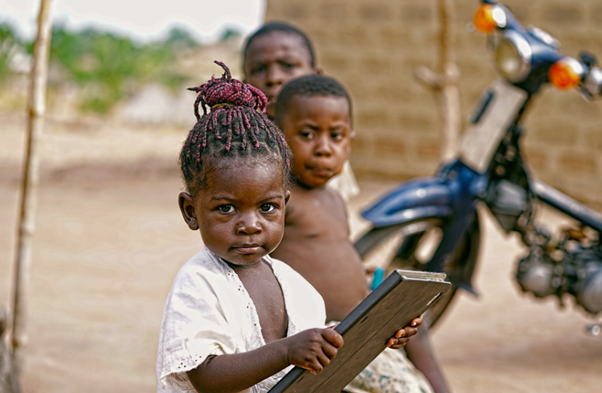African child sponsorship programs go beyond the simple act of providing financial assistance to an individual child. They encompass a holistic approach that seeks to empower not just the child but also their families and communities. By investing in education, healthcare, and essential resources, child sponsorship programs create a ripple effect that reverberates through entire communities, fostering a culture of empowerment, resilience, and sustainable development.
The transformative power of child sponsorship doesn’t stop at the individual or the immediate family. It has the potential to impact the entire community. Sponsored children often attend schools built and supported by child sponsorship programs, which not only uplift the quality of education but also contribute to the infrastructure and development of the community as a whole. Moreover, child sponsorship programs often invest in projects that address the specific needs of the community, such as improving healthcare facilities, providing clean water, or supporting income-generating initiatives.
Empowering Children
Child sponsorship plays a pivotal role in empowering individual children. By providing the necessary resources, it enables them to access education, healthcare, and other essential services. Many sponsored children come from disadvantaged backgrounds, where access to such basic needs is limited. Through sponsorship, these children are given opportunities that were once out of reach.
Education is a key aspect of empowerment. With access to quality education, sponsored children can acquire knowledge and skills that will shape their future. They become equipped to break the cycle of poverty and create a better life for themselves and their families. Moreover, sponsored children often receive emotional and mentoring support, which boosts their confidence and instils in them a belief in their own potential.
Strengthening Families
African child sponsorship programs don’t just focus solely on the sponsored children. They also aim to strengthen families and provide them with the necessary support and resources. By addressing the underlying challenges and needs of families, child sponsorship programs contribute to creating a more nurturing environment for children.
Economic empowerment is a crucial aspect of supporting families. Many child sponsorship programs provide vocational training, microfinance initiatives, or small business support to parents and caregivers. These opportunities enable families to generate stable incomes, become self-sufficient, and escape the clutches of poverty. As families thrive, they create a positive and nurturing space for their children to grow and develop.
Community Development
Child sponsorship programs have a significant impact on the broader community. By investing in the well-being of individual children and families, these programs contribute to community development in various ways. They initiate and support community projects that enhance infrastructure, healthcare facilities, and educational opportunities.
For example, sponsored children often attend schools that are supported and funded by child sponsorship programs. This not only benefits the children but also contributes to the betterment of the entire community. When children receive an education, they are more likely to become active and productive members of society, which, in turn, uplifts the community as a whole.
Long-Term Impact
The impact of African child sponsorship extends far beyond the immediate benefits for individuals and families. It has the potential to create lasting transformation and break the cycle of poverty for future generations. The ripple effect of child sponsorship can be seen in empowered individuals who grow up to become leaders and change-makers in their communities.
When sponsored children become successful and self-sufficient adults, they become role models for younger generations. They inspire others to believe in their own potential and work towards a brighter future. As more and more individuals break free from poverty and become active contributors to society, the cycle of poverty gradually diminishes, leading to sustainable change for the entire community.
Tips to Choose the Right Child Sponsorship
- Research and due diligence: Conduct thorough research on different African child sponsorship programs. Look into their track record, reputation, and transparency. Read reviews and testimonials from previous sponsors to get a better understanding of their effectiveness and impact.
- Mission and values alignment: Consider the mission and values of the child sponsorship program. Ensure that their goals align with your own beliefs and values. Look for programs that prioritise community development, long-term sustainability, and holistic support for children and their families.
- Program focus and approach: Evaluate the program’s focus and approach to child sponsorship. Does the program prioritise education, healthcare, and essential resources? Is there a comprehensive support system in place to address the broader needs of children and their families? Look for programs that have a holistic approach and invest in sustainable development.
- Transparency and accountability: Transparency and accountability are crucial factors to consider. Look for programs that provide detailed information about how donations are used and have clear financial reporting mechanisms. Check if they have independent audits or evaluations to validate their impact.
- Local partnerships and community involvement: Assess whether the child sponsorship program has strong partnerships with local organisations and communities. Programs that involve the community in decision-making and project implementation tend to have a more significant and sustainable impact.
- Communication and sponsor involvement: Consider how the program facilitates communication between sponsors and sponsored children. Look for programs that encourage regular updates, correspondence, and opportunities for sponsors to participate in the child’s development. Personal connections and engagement are essential for building a meaningful relationship with the child.
- Cost and sustainability: Understand the cost structure of the child sponsorship program. Assess the program’s sustainability in the long run and how they ensure funds are allocated efficiently. Look for programs that invest in community projects and initiatives that create a lasting impact, rather than relying solely on individual sponsorships.
Conclusion
African child sponsorship is a catalyst for empowering communities and creating a ripple effect of positive change. By understanding the broader impact of child sponsorship programs and supporting initiatives that prioritise community development, we can contribute to breaking the cycle of poverty and creating a brighter future for African children and their communities. Let’s embrace the ripple effect of this sponsorship and be a part of transformative change that uplifts individuals, families, and entire communities.




